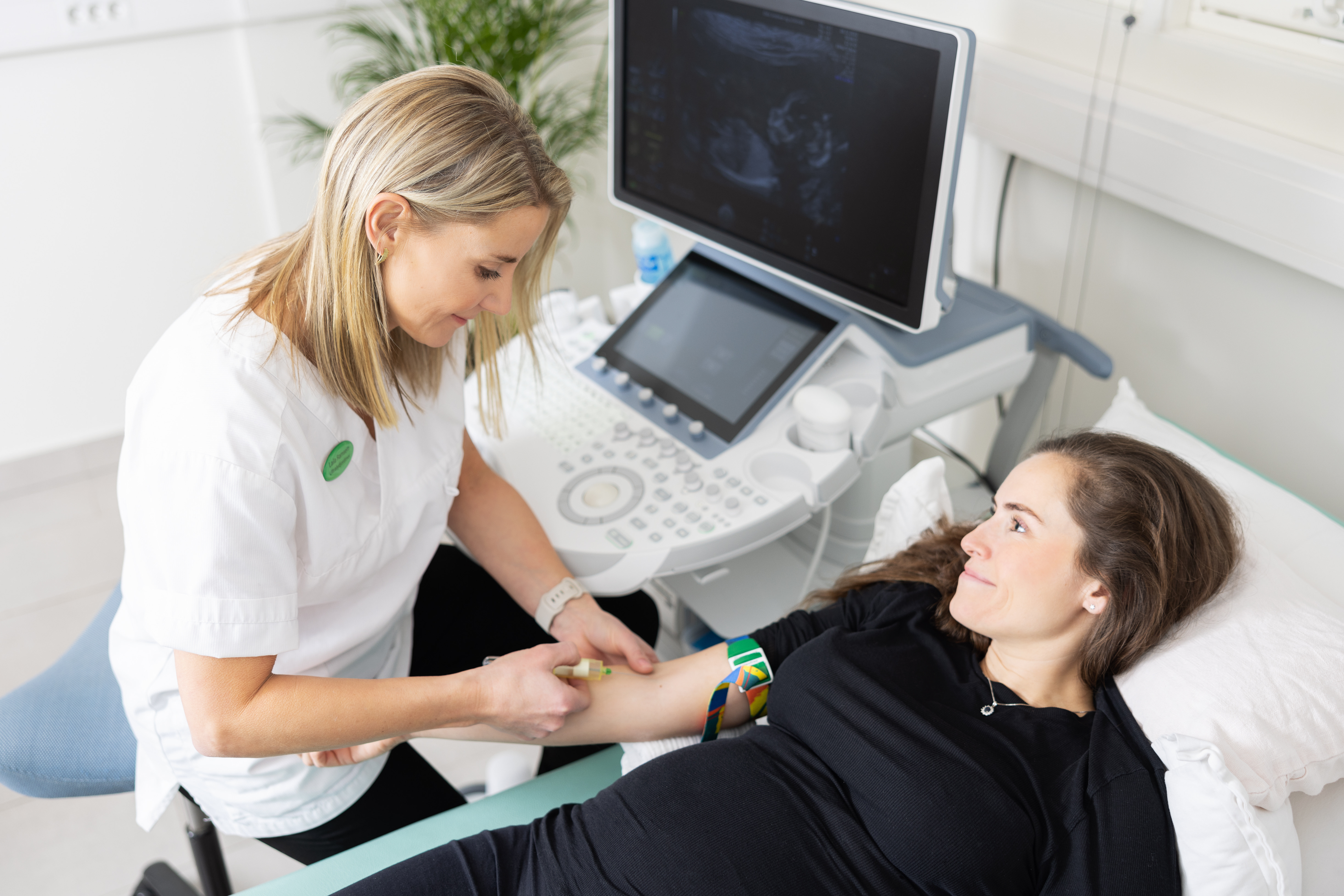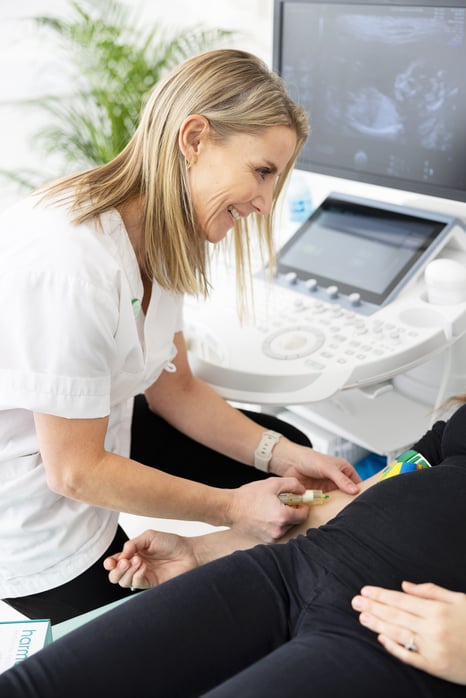
What is NIPT?
Non-Invasive Prenatal Test (NIPT) is an advanced screening test that involves a simple blood sample. This test is used to assess the likelihood of chromosomal abnormalities, which can lead to serious birth defects in the child.
In Norway, NIPT tests for:
Trisomy 21 (Down syndrome)
Trisomy 18 (Edwards syndrome)
Trisomy 13 (Patau syndrome)
How does the test work?
During pregnancy, the mother's blood contains fragments of the fetus' DNA. This genetic material is believed to originate from cells in the placenta that embed in the uterine wall, allowing them to mix with the mother's bloodstream. Since the placenta shares the same genetic origin as the fetus, it generally carries the same chromosomal information. This means that, in principle, all genetic material (DNA) can be analyzed before the baby is born.

In Norway, NIPT does not provide any additional information about the fetus or the mother. It is a gentle, safe, and reliable test for detecting these three specific chromosomal abnormalities.
The blood sample is taken from the mother’s arm and can be performed from a pregnancy length of 10+0 weeks until the end of the pregnancy. NIPT is done in combination with an ultrasound examination.
NIPT can also be performed in twin pregnancies at our clinic.
The test results from NIPT are usually available in about 4-7 days working days.

NIPT and ultrasound
The blood sample is easily drawn from the mother's arm and can be taken from 10 weeks of pregnancy onward. We perform NIPT in combination with an ultrasound examination to check for cardiac activity, determine if there is more than one fetus, and measure the gestational age of the fetus.
"The NIPT-school" must be completed in advance
It is important to us that pregnant women considering NIPT are well informed about the test, what it involves, its limitations, and the potential implications of the results. Therefore, we encourage you to complete an online tutorial called the NIPT School. You can select the English language option at the NIPT School. The tutorial provides detailed information about NIPT, including the safety and reliability of the test and the possible consequences of the results. The content has been validated by specialists in fetal diagnostics, genetics, neonatology, and pediatrics. The NIPT School is free of charge.
The NIPT test result
You will recieve the result within 4-7 working days
The test results will be sent to you via bankID, or by mail if preferred.
If the NIPT result is inconclusive or if there is insufficient DNA material, we will contact the pregnant woman by phone. Sometimes, a new sample needs to be taken at no additional cost.
If the NIPT indicates a high likelihood of trisomy 13, 18, or 21, the pregnant woman will be referred to the fetal diagnostic department at Rikshospitalet for a follow-up ultrasound and an invasive test to confirm or rule out the suspicion. In these cases, we will communicate the test results by phone.
A positive test result may present difficult decisions. If the woman wishes to terminate the pregnancy, abortion is freely available up to 12 weeks of gestation. After this period, termination is granted based on an application to the abortion board, depending on the severity of the condition. The woman is not obliged to terminate the pregnancy regardless of the test results. She has the right to make her own decision about what is best for her.
More information about NIPT
The blood sample will be completely destroyed after the test results are available and the patient has been informed. This means that further analyses cannot be performed.
In the public sector, the existing guidelines for prenatal diagnostics and the NIPT test apply. Read more about them here.
For more information about prenatal diagnostics and NIPT, visit: Fosterdiagnostikk og NIPT.
FAQ about NIPT
Do I have to do an ultrasound with NIPT? Can't I just take the blood test?
NIPT should be performed in conjunction with an early ultrasound starting from 10+0 weeks, or during a targeted organ ultrasound between weeks 12 and 14. This ensures confirmation of cardiac activity and the number of fetuses before the blood sample is taken.
What if I change my mind about doing NIPT during my appointment or if there are other reasons why the blood test cannot be taken?
If you order a NIPT test, but the blood test is nok taken for any reason during the consultation, you only get charged for the ultrasound.
Is it recommended to take the NIPT test at the hospital or at a private clinic?
There is no difference in the NIPT test itself, whether it is done at the hospital or with a private provider – both test for trisomy 13, 18, and 21. The difference lies in the timing of the test and the response time: At the hospital, the test is usually offered in conjunction with an ultrasound around weeks 12-14, with a response time of up to 14 business days. With us, however, you can take the test as early as week 10+0, and you will receive results within 4-7 business days.
How accurate is NIPT?
NIPT has a sensitivity of 95%-99%, while ultrasound has a sensitivity of 75%-85%. It is important to understand that these screening methods are complementary and do not exclude each other. NIPT and the ultrasound performed between weeks 12 and 14 are distinct techniques that, when used together, enhance the reliability of fetal examinations. If NIPT results indicate a high probability of chromosomal abnormalities, an invasive test is recommended to confirm or refute the NIPT findings. For such confirmatory testing, we refer patients to the fetal diagnostics department at Rikshospitalet.
In case of suspicion of illness or abnormalities, what happens next?
The midwives who perform ultrasound have completed one year of foetal diagnosis at the National Centre for Emergency Medicine at NTNU. If we see pictures that deviate from the normal we will refer the woman to a maternal-foetal medicine specialist at the National Hospital. She’ll then get an appointment within a few days.
.jpg?width=200&height=117&name=OJUK%20logo_m%20bindestrek%20(002).jpg)